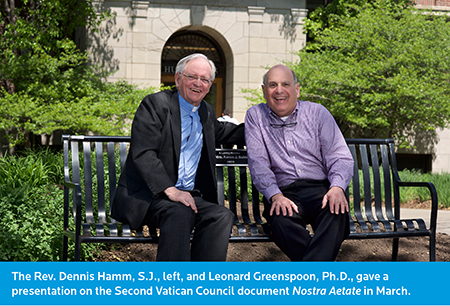 How groundbreaking was Nostra Aetate when it was promulgated by Pope Paul VI on Oct. 28, 1965?
How groundbreaking was Nostra Aetate when it was promulgated by Pope Paul VI on Oct. 28, 1965?
Hamm: Nostra Aetate acknowledged what Catholic Christianity has in common with other world religions, advocated for dialogue and collaboration with other religions, acknowledged that non-Christian religions mediate valuable truths and it confronted the teaching of contempt regarding Judaism.
Greenspoon: For those within the Jewish community and the Catholic Church who had been working on this document for many years, this came as the hoped-for culmination of much prayerful hard work. For everyone else, the Church’s declarations were not anticipated, but a welcomed achievement.
Can you briefly place this document in its historical, cultural and social context?
Hamm: Given that Church councils up through Vatican I had been mainly European gatherings, Vatican II was the first council with truly worldwide representation. In the 1960s, globalization was awakening most people’s sense of being part of a world community and this new situation made the relationship of the Catholic Church with non-Christian religions an urgent matter. In particular, we Catholics needed to overcome some false understandings and attitudes toward our close religious relatives, the Jews.
Greenspoon: The document appeared 20 years after the end of World War II and the first recognition of the horrors of the Holocaust and the roles played by self-professed Christians. As a sign that the Church recognized Judaism as a valid religion on its own terms, the document set the tone for both official and personal interactions for the decades that followed.
What particular elements of this document stand out to you?
Hamm: The fresh starting point regarding our relationships with non-Christian religions, beginning with what we have in common as religious human beings rather than starting with a focus on our differences.
Greenspoon: Up until Nostra Aetate, the Church’s teaching was that all Jews in all times bore guilt for Jesus’s crucifixion. In reversing the “teaching of contempt,” the Church took the first of many needed steps toward repudiating its anti-Jewish statements and activities.
What is the biggest positive effect this has had on interreligious dialogue and cooperation?
Hamm: The growing realization that members of the religions of the world have much to learn from one another and that all religions hold resources for collaborating on issues of justice and peace.
Greenspoon: Nostra Aetate paved the way for interreligious dialogue based on mutual respect. It allowed for religious communities, while acknowledging their distinctive features, to work together to combat issues such as racism, poverty and global warming.
Nostra Aetate is Latin for “in our time.” How is this document still relevant today, and where do we need improvement?
Hamm: We need to be more creative in our interreligious dialogue. One wonderful sign of hope: here in Omaha, a group called the Tri-Faith Initiative is building a shared campus featuring a synagogue, a church, a mosque and a fourth structure, “Abraham’s Tent,” which is a meeting place hosting a library with scholarly resources from all three traditions — Jewish, Christian and Islamic.
Greenspoon: In many ways, Nostra Aetate and similar documents are aspirational, but everyone realizes that true and significant change doesn’t occur overnight. It’s an ongoing process that has its setbacks, as well as advances. Until respect and understanding characterize all of our thoughts and actions, there is still much room for improvement.